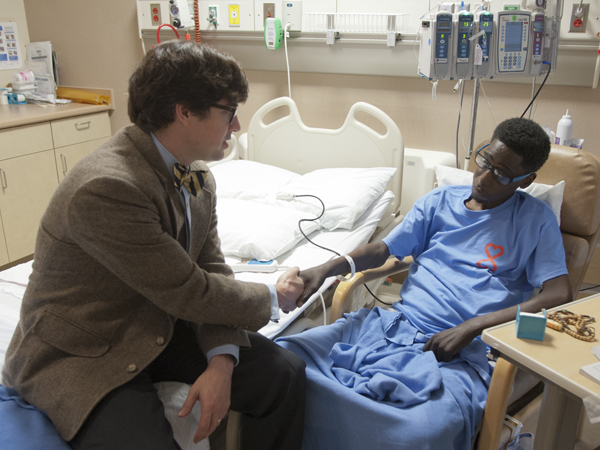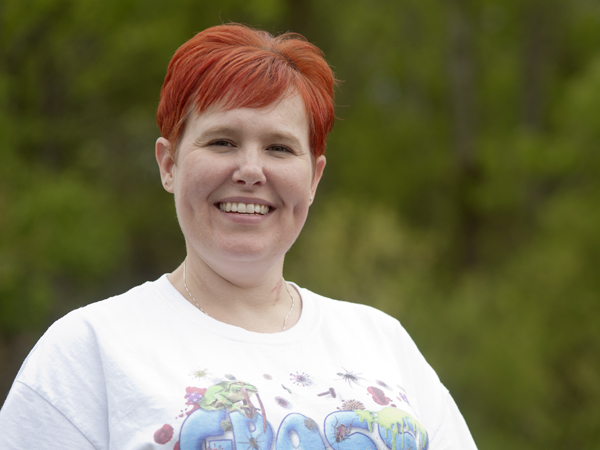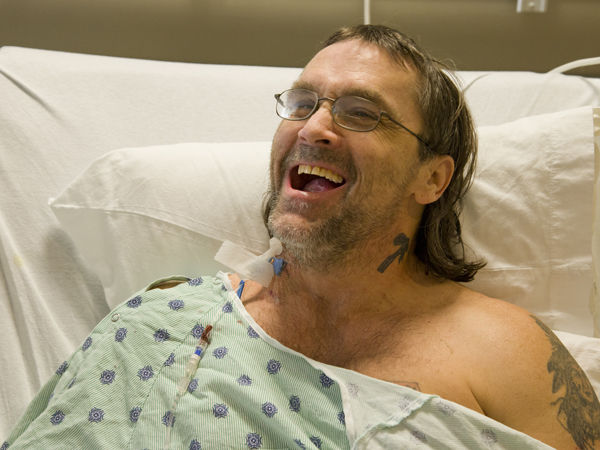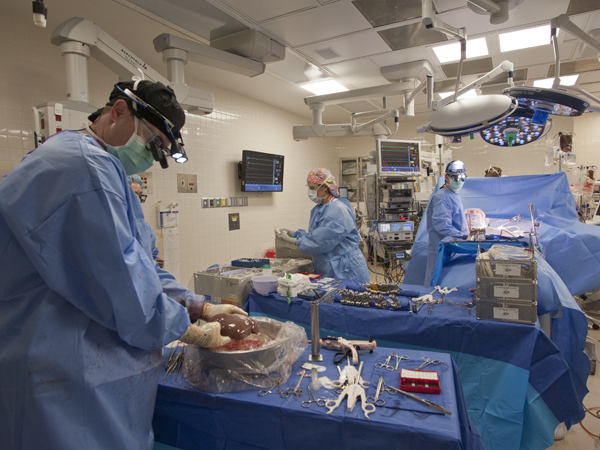Fifty livers in two years: UMMC transplant program thriving

Published in News Stories on April 30, 2015
When Utica resident Dennis Mitchell received a new liver April 14 at the University of Mississippi Medical Center, it greatly improved his chances of enjoying a normal life.
It also marked a huge milestone for the Medical Center. Mitchell received the 50th liver since the 2013 jump-starting of UMMC's long-dormant liver transplant program.
His procedure was a proud undertaking for his surgeons, Dr. Mark Earl and Lucedale native Dr. Christopher Anderson, who was recruited to UMMC in August 2011 with a mission: Bring back the liver transplant program following a 20-year hiatus, and build an abdominal transplant team to keep that momentum going.
"We're doing world-class transplants in terms of complexity. We've built the team and support staff to do it here," said Earl, assistant professor of surgery and one of Anderson's 2012 recruits. The East Texas native formerly was an abdominal transplant surgeon at Oregon Health and Science University and had trained with Anderson for a decade before that.
"New transplant programs don't come up very often, especially for liver. They struggle to do what we're doing. The majority wouldn't even consider tackling what we've done," Earl said. "We're pleased, but we still have a lot of growth to come."
That first liver recipient, on March 5, 2013, was south Jackson resident Karen Battle. Like many who followed her, the 38-year-old is honoring her second chance at life after living with crippling autoimmune hepatitis.

Battle, now 38
"That's so hard to believe," she said of the transplant team's 50th procedure. "If it wasn't for this program, I probably wouldn't be here."
In the years before Anderson arrived at the Medical Center, Mississippians had no choice but to leave the state -- often, at great hardship and personal expense -- for a liver transplant, with the closest programs located in Alabama and New Orleans. The Medical Center's kidney transplant program at the time wasn't meeting demand, with 50-70 performed annually, yet an estimated 100 patients having to leave the state.
It took Anderson, associate professor and chief of the Division of Transplant Surgery, only a year to attract some of the best and brightest in the field of transplantation and nephrology. That team included Earl, who's trained in liver, kidney and pancreas transplant; Dr. Brian Borg, the first and only transplant hepatologist in Mississippi; Dr. Steven Wagner, a transplant nephrologist; and Dr. Iasmina Craici, a nephrologist.
They joined Dr. Luis Juncos, professor and chair of nephrology; Dr. Kenneth Kokko, a nephrologist and medical director of the renal transplant program; Dr. Mehul Dixit, who specializes in children's nephrology and kidney transplant; Dr. Shirley Shlessinger, a nephrologist; and nurse practitioner Ashley Seawright. Dr. James Wynn, a kidney and pancreas transplant and vascular access surgeon, has become part of the team since then.
The team transplanted a record 103 kidneys that first year as Anderson worked to earn approval from the United Network for Organ Sharing to resume the liver transplant program. That hurdle was cleared in late January 2013. Barely two months later, Battle and the transplant team ushered in a new era.

Davis was all smiles after his successful pancreas and kidney transplant
After that came more milestones: In a first for UMMC and the state, surgeons on Dec. 13, 2013, transplanted a pancreas and kidney into 49-year-old Paul Davis of Monticello, who coped with type 1 diabetes. It marked the completion of the Medical Center's abdominal transplant program, allowing yet more of the state's residents to get life-saving transplants close to home.
Then, Anderson's team achieved another first. Jackson resident and brittle diabetic Nancy Smith, 52, on Sept. 30, 2014, became the first person in the state to receive an isolated pancreas transplant, not the more medically common combination of a pancreas and kidney.
Davis and Smith were relatively healthy when they received their transplants. Not so with Battle and Mitchell, whose procedures were very complex.
Her kidneys failing and drifting between confusion and unconsciousness, Battle was so gravely ill that the transplant team wasn't sure she'd even be a candidate. Just a few days after she was put on the transplant waiting list, she went into surgery.
"When I woke up, I knew that things were going to be better. I had hardly any pain. Everyone said that I was a good patient, and not grouchy or irritable. I was just so thankful."
Mitchell, 33, who suffered a debilitating gunshot wound to his abdomen during an altercation at a club in 2008, also lay in a UMMC hospital bed in the days before his transplant, sickened to the point that he needed a liver quickly in order to survive. "On some days, everything would be normal," he said of the long months he was in liver failure. "And there would be other days I was so sick, I didn't know what was going on."
"He told me that if they didn't find me a liver, I wasn't going to make it," Mitchell remembered Earl saying. "He said it was up to me to take care of myself after that."
The transplant team's growing number of surgeries "just shows you how great the need is," Battle said. "If not for Dr. Anderson having a vision, then all of those people would have had to go somewhere else, and those places aren't nearly as compassionate and hands-on as UMMC. You're not a number. Everyone they see is special."

As Dr. Mark Earl (back, right) watches, Dr. Christopher Anderson gently lifts the donated liver to be transplanted into patient Dennis Mitchell. Surgery tech Alana Lowe (center) assists.
Mitchell's surgery came 25 months into the rejuvenated liver transplant program. Since Battle's surgery, Anderson "has taken it up to another level. It makes me very proud and very happy," Earl said.
That first year, the abdominal transplant team completed 18 liver transplants, then upped that to 23 in 2014, and 11 so far this year, including two more performed just days after Mitchell's procedure. "We are ahead of projections," Anderson said.
The kidney transplant program has also surged, with 104 performed in 2013, 95 in 2014 and 33 so far this year, said transplant services administrator Dean Henderson. The transplant team performed one pancreas-kidney transplant in 2013, 10 more in 2014, and two so far this year.
"We have projected that the liver program size will likely reach 50 per year within several more years," Anderson said. "The rate of growth is donor dependent, but also it is dependent on patients listed at our center. Our program has grown faster than expected, which is a testament to our team and to doctors in the state."
Unless more people donate organs, Anderson and Earl say, the transplant program will be hard pressed to reach its potential.
"The number of people dying who are waiting for transplants is going up," Earl said. "We desperately need more donors."
"Our state has one of the highest incidences of renal disease and dialysis and a growing wait list of patients waiting for a kidney transplant," Anderson said. "It is clear that patients live longer with a kidney transplant compared to dialysis alone, so organ donation is extremely important in Mississippi.
"The same goes for liver transplant. We have a growing need in our state," he said. "Patients are dying here and throughout the United States waiting on donor organs. Organ donation truly saves lives."
It didn't take Battle long after surgery to do the simple things that a failed liver took from her and Mitchell. "I've been able to drive," Battle said. "I'm able to do outdoor activities with my children, and I'm walking and going to the gym."
She has a message for Mitchell and others who will get a new liver at the Medical Center.
"Hang in there," Battle said. "The sunshine will be coming out within a matter of days."


